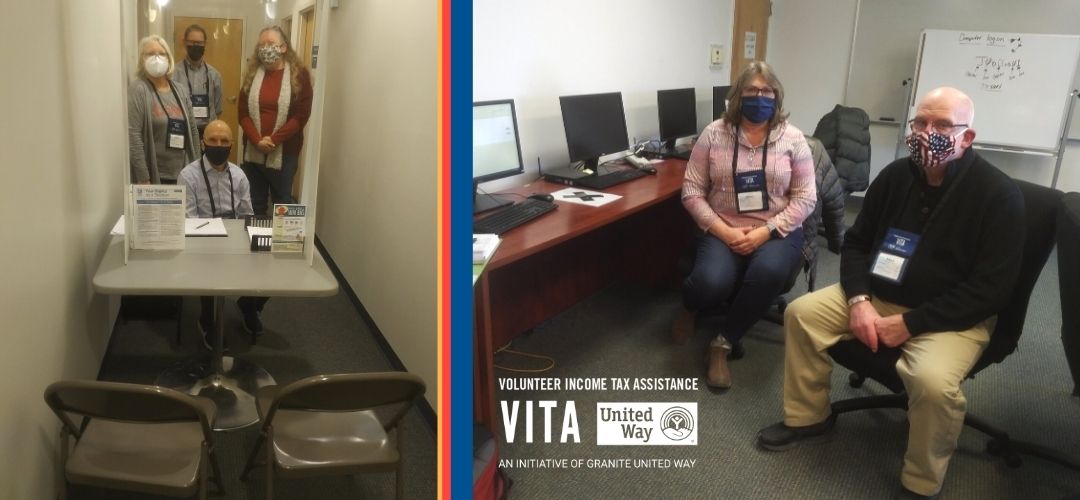You Might Qualify For This Important Tax Credit

The Earned Income Tax Credit (EITC) provides millions for working people in NH and VT, but many people don’t know they are eligible to claim it.
If your income was below $56,844 in 2020, you may be missing out on an important tax benefit. The Earned Income Tax Credit is a support for working families who don’t make a lot of money. Like other tax credits, the EITC is like getting a gift card for your federal income taxes.
Unlike a tax “deduction”, which reduces your income that is considered “taxable” (reduces the amount you pay in taxes that year), tax “credits” pay your tax bill directly, dollar for dollar.
There are many different types of tax credits; including the Child Tax Credit, Child and Dependent Care Credit, and Retirement Savers Credit, but what makes the EITC unique is that it’s fully refundable.That means once your tax bill is reduced to $0, anything remaining on the “gift card” is refunded to the taxpayer.
To be eligible for the EITC, tax filers must have earned an income from a job or self-employment. Depending on your income and number of children, that can mean as much as $6,660 for 2020.
According to the Internal Revenue Services (IRS), nearly 1-in-4 working people who are eligible for this important tax benefit do not claim it. Based on IRS data for 2018 (the 2019 tax filing period) this means that in New Hampshire alone, more than $49 Million is left on the table.
Some of our most financially unstable neighbors are missing out on this money as they fall into the EITC gap. The following are a list of just some of the individuals eligible for the EITC:
Grandparents raising their grandchild(ren)
An estimated 10,000 children in NH were being raised by their grandparents before the pandemic. Many of these situations were the result of the continuing opioid epidemic that left many parents unable to raise their children and grandparents often stepped in. If those grandparents are working to support the child, they may be able to get additional support from the EITC. Many grandparents do not realize they are eligible, and we’ve heard of some too proud to claim this benefit for which they are eligible. While the EITC cannot eliminate the emotional and physical toll of providing kinship care, it can help with household expenses.
Foster parents
As with “grandfamilies”, foster parents are also eligible to claim their foster children for the ETIC. As with claiming any child, eligibility rules apply, including where the child lived for most of the year, and if they meet the age requirements (up to age 19, 24 if a full-time student, or any age if permanently or totally disabled).
Caregivers with an adult child who is permanently and totally disabled
Many of our Volunteer Income Tax Assistance (VITA) clients have utilized the EITC in this way. This includes a mother who used the $2,000 EITC to build a wheelchair ramp for her adult son at their home. Our volunteer tax preparer did her current year’s return and went back to file an amendment to make changes to her returns for three prior years. Her expected $1,000 refund became $10,000.
Working people with very low income
All workers are eligible for a “standard deduction” based on their tax filing status. For a single person with no dependents, that amount is $12,400 and for a married couple filing together it is twice that, $24,800 for 2020. That means someone with an income below those amounts is not required to file a tax return. However, many people may still have earned income by working for someone else or themselves. Eligibility for the EITC begins with $1 of earnings and the only way to claim the EITC is to file a tax return.
People without a child to claim
The larger benefit of the EITC goes to those who have an “eligible child” to claim, as mentioned above. However, many working people don’t realize they may still be able to claim the credit, even with no child to claim. These workers may include non-custodial parents as well as those who have no children. Eligibility is restricted to workers age 25-64 with an income up to $15,820 for single filers ($21,710 for married couples filing jointly). The maximum credit is $538. Granite United Way and others are engaging in advocacy to support proposals to widen the age eligibility for filers and to increase the income and ETIC amounts.
Working people who have a disability and fear losing their benefits
There are many people in the workforce who are receiving disability benefits. That lifeline is critical and there is worry about anything that might disrupt those benefits. Too much in income or assets may put the worker at risk of falling off of the “benefits cliff”. The EITC is a guardrail against the benefits cliff. Receiving the credit won’t affect benefits. Nor will keeping the refund on file interfere with “asset tests” for up to 12 months. That asset provision includes anyone receiving benefits, such as housing vouchers or fuel assistance, that comes through the federal government.
If a lot of this was confusing – we totally understand.
The good news is, free tax help is available! For those who have a home computer with internet access, MyFreeTaxes.com is for you. There is a toll-free helpline to help navigate the tax software and to understand the EITC and other benefits.
Granite United Way and other partners also provide community-based free tax preparation through the Volunteer Income Tax Assistance (VITA) Program. To schedule a virtual appointment this year visit NHTaxHelp.org or call 2-1-1.